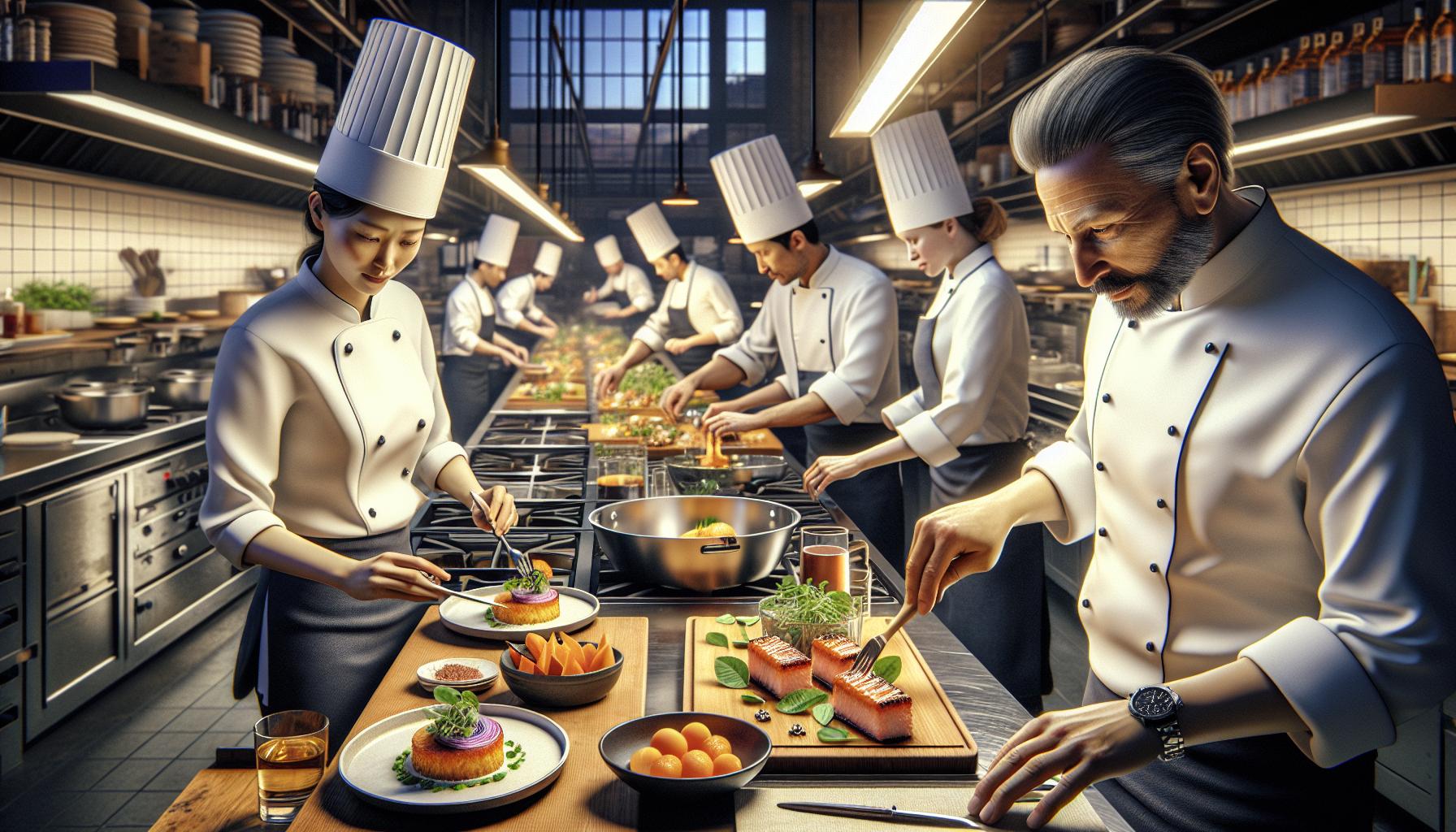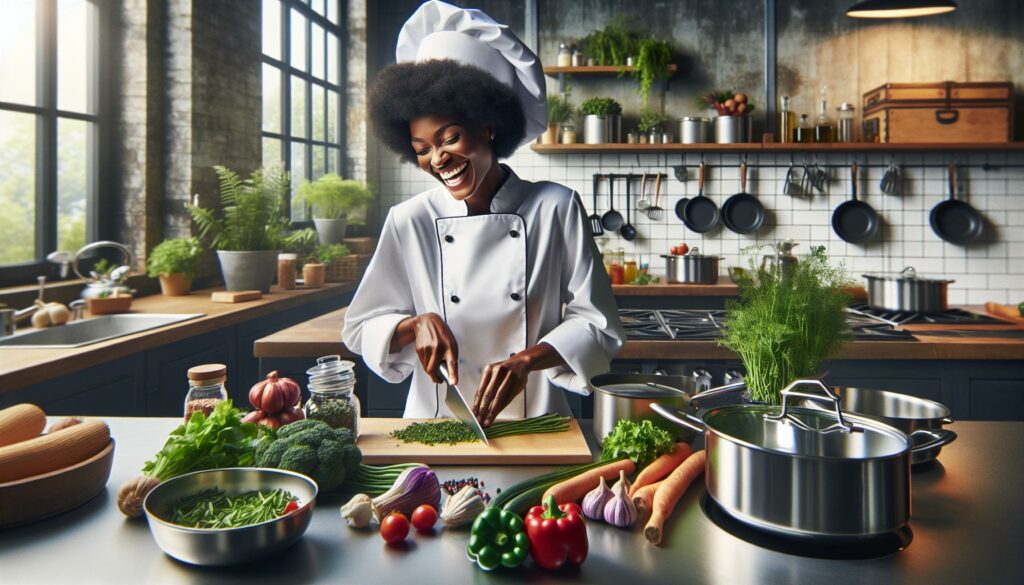Dreaming of turning kitchen chaos into culinary masterpieces? A Bachelor’s in Culinary Arts isn’t just about learning to chop onions without crying – it’s a gateway to becoming a kitchen virtuoso. This degree combines the artistry of food preparation with the science of gastronomy creating a recipe for success in the dynamic food industry.
From mastering classical French techniques to exploring modern molecular gastronomy students dive deep into a world where creativity meets precision. The program goes beyond just cooking equipping future chefs with essential business skills restaurant management expertise and food safety knowledge. It’s the perfect blend of hands-on experience and academic rigor that transforms passionate foodies into professional culinary artists ready to make their mark in kitchens worldwide.
Bachelor’s in Culinary Arts
A Bachelor’s in Culinary Arts degree combines hands-on kitchen training with academic coursework in food science, nutrition, and business management. This four-year program integrates practical cooking techniques, food safety protocols, and restaurant operations knowledge.
Core components of the degree include:
- Classical French culinary methods
- International cuisine studies
- Food chemistry and nutrition principles
- Menu planning and cost control
- Restaurant management systems
- Food safety and sanitation practices
The curriculum structure divides into:
| Component | Time Allocation | Focus Areas |
|---|---|---|
| Kitchen Labs | 40% | Cooking techniques, food preparation |
| Classroom Studies | 35% | Theory, nutrition, food science |
| Business Courses | 25% | Management, accounting, marketing |
Students gain expertise through:
- Hands-on cooking experience in professional kitchen facilities
- Real-world internships at restaurants or hotels
- Recipe development and menu creation projects
- Food costing and inventory management training
- Leadership roles in student-run restaurants
The program differs from culinary certificates by offering:
- Advanced theoretical knowledge in food science
- Comprehensive business management training
- Research opportunities in food innovation
- Extended internship experiences
- Higher-level professional networking connections
- Executive Chef
- Food Service Director
- Restaurant Owner
- Corporate Chef Consultant
- Food and Beverage Manager
Core Coursework and Curriculum

A Bachelor’s in Culinary Arts curriculum focuses on three essential pillars: food science, restaurant operations, and advanced cooking methods. Students engage in both theoretical coursework and practical applications throughout the program.
Food Science and Nutrition
Food science courses explore the chemical and biological properties of ingredients during cooking processes. Students learn molecular gastronomy principles, ingredient interactions, and nutritional value preservation techniques. The curriculum covers food chemistry fundamentals, including protein denaturation, Maillard reactions, and emulsion stability. Laboratory sessions demonstrate fermentation processes, flavor development, and texture modification methods. Course assignments include analyzing nutrient composition, developing balanced menu items, and creating allergen-free alternatives for common dishes.
Restaurant Management
Restaurant management courses teach operational systems, financial planning, and team leadership skills. Students master inventory control methods, cost analysis techniques, and profit optimization strategies. The curriculum includes point-of-sale systems training, staff scheduling protocols, and vendor relationship management. Course projects focus on creating business plans, developing marketing strategies, and implementing quality control measures. Students practice real-world scenarios through simulated restaurant operations and guest service coordination.
Advanced Cooking Techniques
Advanced cooking instruction combines classical French methods with contemporary culinary innovations. Students master knife skills, sauce production, meat fabrication, and pastry techniques. The curriculum incorporates global cooking methods from Asian, Mediterranean, and Latin American cuisines. Practical sessions cover sous-vide cooking, molecular gastronomy applications, and modern plating designs. Students develop specialized skills in areas like artisan bread baking, chocolate work, and advanced garde manger preparations. Course assignments include menu development, food photography, and recipe standardization.
Career Opportunities After Graduation

A Bachelor’s in Culinary Arts opens diverse career paths in the food service industry. Graduates enter roles ranging from kitchen leadership to corporate food service management.
Executive Chef Positions
Executive chefs lead professional kitchen operations in upscale restaurants, hotels, resorts, private clubs. Their responsibilities include menu creation, staff supervision, food cost management, quality control. The average salary for executive chefs ranges from $65,000 to $125,000 annually, based on location and establishment type. Career progression often starts as sous chef, advancing through positions like chef de cuisine before reaching executive chef status. Top employers include Michelin-starred restaurants, luxury hotel chains (Four Seasons, Ritz-Carlton), cruise lines (Royal Caribbean, Celebrity) corporate dining facilities.
Food Service Management
Food service managers oversee operations in establishments ranging from casual dining chains to institutional facilities. Core responsibilities include budget management, staff training, inventory control, compliance with health regulations. The position offers an average annual salary of $55,000 to $85,000, varying by organization size and location. Career paths include roles in corporate cafeterias, healthcare facilities, educational institutions, stadium concessions. Leading employers include Compass Group, Aramark, Sodexo, plus independent restaurant groups, hotels, resorts. Management positions require expertise in both culinary operations and business administration.
Top Culinary Schools and Programs

Leading culinary institutes combine classical training with modern techniques to prepare students for successful careers in the food industry. These programs emphasize hands-on experience while maintaining rigorous academic standards.
Admission Requirements
Top culinary schools evaluate candidates based on specific academic credentials. Applicants submit high school transcripts showing a minimum GPA of 2.5 with completed coursework in mathematics, science, and English. Students provide ACT scores (minimum 18) or SAT scores (minimum 980). Letters of recommendation from teachers or industry professionals demonstrate the candidate’s passion for culinary arts. Prior kitchen experience through part-time jobs or internships strengthens applications. International students submit TOEFL scores (minimum 80) or IELTS scores (minimum 6.5) to verify English proficiency.
Program Costs
Annual tuition rates at leading culinary schools range from $15,000 to $35,000. Here’s a breakdown of typical program expenses:
| Expense Category | Annual Cost |
|---|---|
| Tuition | $15,000-35,000 |
| Kitchen Equipment | $1,200-2,000 |
| Uniforms | $300-500 |
| Textbooks | $800-1,200 |
| Lab Fees | $1,000-1,500 |
Additional expenses include professional knives ($500-800), safety certification fees ($200-400), and optional culinary competition participation ($300-600). Financial aid packages combine scholarships, grants, work-study programs, and student loans to offset these costs.
Industry Experience and Internships
Professional internships form an integral component of the Bachelor’s in Culinary Arts program, offering 600-1200 hours of hands-on training in commercial kitchens. Students gain practical experience through rotational placements in restaurants, hotels, resorts, catering companies and food service establishments.
Top culinary programs partner with prestigious establishments:
- Michelin-starred restaurants providing advanced kitchen techniques
- Luxury hotel chains offering diverse food service operations
- Corporate dining facilities teaching large-scale production methods
- Artisanal bakeries specializing in pastry and bread making
- Catering companies focusing on event planning and execution
During internships, students participate in:
- Menu planning and recipe development
- Food cost control and inventory management
- Kitchen team coordination and scheduling
- Food safety protocol implementation
- Special event preparation and service
| Internship Type | Duration | Focus Areas |
|---|---|---|
| Restaurant | 300-400 hours | Line cooking, station management |
| Hotel | 200-300 hours | Multiple outlet operations |
| Catering | 100-200 hours | Event planning, production |
| Specialty | 100-200 hours | Pastry, bread, butchery |
Students receive performance evaluations from industry professionals, documenting their skill development across technical proficiency, teamwork capabilities and leadership potential. Many program graduates secure permanent positions through their internship connections, with 65% of students receiving job offers from their host establishments before graduation.
- High-volume production environments
- Professional kitchen equipment
- Industry-standard procedures
- Real-time problem solving
- Contemporary culinary trends
Skills Developed During the Program
A Bachelor’s in Culinary Arts develops comprehensive expertise through intensive hands-on training and theoretical education. Students master both technical culinary abilities and essential business management skills throughout the four-year program.
Technical Culinary Skills
Students acquire advanced knife skills mastering multiple cutting techniques including julienne, brunoise, and chiffonade. They learn precise temperature control methods for cooking proteins, vegetables, and sauces to achieve optimal results. The program teaches classical French cooking methods alongside contemporary culinary innovations, enabling students to create complex flavor profiles. Advanced baking techniques focus on artisanal bread making, pastry production, and chocolate work. Students gain expertise in global cuisine preparation, molecular gastronomy applications, and specialized dietary cooking methods. Food safety certification training ensures proper handling, storage, and sanitization practices in professional kitchen environments.
Business Management Abilities
Students develop financial management skills through courses in cost analysis, menu pricing, and budget planning. The program teaches inventory control systems, vendor relationship management, and supply chain optimization strategies. Leadership training focuses on kitchen team coordination, staff scheduling, and effective communication methods. Students learn marketing strategies including social media management, brand development, and customer relationship techniques. Restaurant management courses cover point-of-sale systems, reservation management, and quality control procedures. The curriculum includes food cost calculations, profit margin analysis, and revenue optimization strategies. Legal compliance training addresses health codes, labor laws, and food service regulations.
Career Opportunities in the Food Service Industry
A Bachelor’s in Culinary Arts degree opens doors to diverse career opportunities in the food service industry. The comprehensive curriculum blends practical kitchen skills with essential business knowledge preparing graduates for leadership roles in prestigious establishments.
The combination of hands-on training internships and academic coursework creates well-rounded professionals who understand both the artistry and business aspects of culinary operations. With competitive salaries and numerous advancement opportunities graduates can look forward to rewarding careers as executive chefs restaurant managers or culinary entrepreneurs.
This degree offers more than just cooking skills – it’s a pathway to becoming a respected leader in the culinary world equipped with the expertise to innovate and excel in this dynamic industry.

